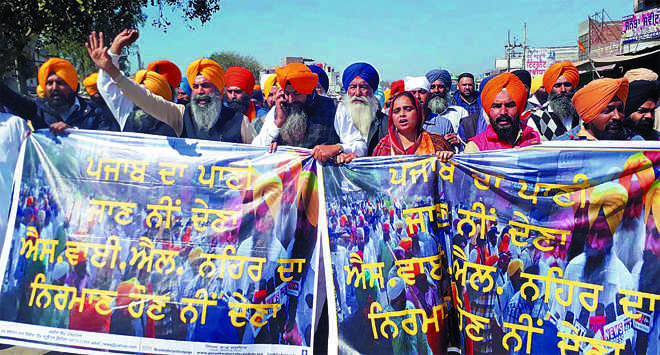
Loosen up: A rigid approach will only prolong litigation and promote political drama.
Yogendra Yadav
PUNJAB and Haryana might have missed a historic opportunity to settle their long- standing river water dispute. This opportunity arose on May 12 when Capt Amarinder Singh, the newly elected CM of Punjab, in a meeting of the Northern Zonal Council, offered a negotiated settlement of the SYL dispute. The Haryana Government should have taken up this offer and started negotiations. Unfortunately, that did not happen. Instead both governments went back to their hard positions, closing the possibility of a dialogue. Predictably, political parties in both states have backed their respective governments. We are back to square one now.
At this moment, the Haryana Government feels that it does not need a dialogue, for the law is in its favour. Way back in 2003, the Supreme Court had given a final ruling and had ordered Punjab to build the SYL canal so that Haryana could get its due share of waters. In 2004, the apex court had issued a decree asking the Central government to step in if Punjab does not fulfil its obligations. The then Congress government in Punjab tried to block it by passing a strange law that unilaterally terminated all the earlier water agreements. The law was referred to the Supreme Court and after an inexplicable delay of 12 years, in 2016, the court declared the law as unconstitutional. The Akali-BJP government tried to block this again by de-notifying the land acquired for purposes of building the SYL. The Supreme Court was not amused.
Now, the Haryana Government has filed an execution petition requesting for an order for the implementation of the Supreme Court’s judgment. No doubt, the Haryana Government has an upper hand in this legal battle at the moment. This is why political leaders from Haryana are reluctant to engage in a dialogue with Punjab.
This is unfortunate and short-sighted. The Haryana Government will in all probability get a favourable order from the Supreme Court. But the implementation on the ground may still be far away. It is quite clear that the Punjab Government, backed by all parties of Punjab, will take every possible measure to delay and deny the construction of the canal and the release of waters to Haryana. This would led to a protracted legal and political battle. It is already more than 40 years since the first river water-sharing award was announced by the Central government. The present path being pursued by the Haryana Government could mean many more years. Even if successful, this path would end up in creating avoidable animosity between the people of Punjab and Haryana.
I have repeatedly argued that the water dispute between Punjab and Haryana is a very limited dispute, much smaller than both state governments and their lawyers would have us believe. I have also argued that this dispute is best resolved through political negotiations within the framework of our Constitution. Such a proposal is bound to be misunderstood on both sides. This idea was presumed to be anti-Punjab when I proposed it in 2016, prior to the Supreme Court orders. Now, this may be seen to be going against Haryana’s interests. Nevertheless, let me reiterate the proposal in the spirit of positive nationalism.
The essence of the proposal is that the Haryana Government should agree to a lesser share of water than it is entitled to under the previous agreements. Punjab should agree to a swift implementation of the new agreement, including the construction of the SYL. Let me spell this out.
Let us remember that there is no dispute over the Sutlej waters. The dispute pertains to only the Ravi-Beas waters. Here too, it is agreed that the pre-existing usage of 2.3 MAF by Punjab and 1.1 MAF by Rajasthan is to be respected. The dispute is only about two issues pertaining to additional waters available in the Ravi-Beas rivers. The differences between Punjab and Haryana on both these issues are fairly limited and there is no reason why a sincere dialogue should not sort it out.
On the first issue, Punjab has claimed that the water available for distribution is much less than claimed. The most conservative estimate available for distribution was 15.9 MAF in the 1955 agreement. This initial estimate was revised upwardly to 18.3 MAF in the Eradi Tribunal report of 1987. Punjab has disputed this estimate. Haryana has claimed that a significant proportion of water, up to 3 MAF, is being wasted and allowed to flow to Pakistan. In any case, this is a technical dispute and there is no reason why the existing Ravi Beas Tribunal cannot resolve it. The tribunal has been inoperative for over a decade because of vacancies. The Central government needs to fill these vacancies and let the tribunal give its opinion on this question. This need not hold back the water-sharing agreement which is on a pro-rata basis.
The second dispute is about the share of Punjab in the available water. Successive governments of Punjab have argued that Indira Gandhi’s award of 1976, which gave Punjab 22 per cent water was unfair. This was revised to 25 per cent in the agreement arrived at by the CMs of both states in 1981. The tribunal raised it to 28 per cent in its first report. Political leaders from Punjab have argued that even this is unfair. They have inappropriately invoked the privileges enjoyed by the upper riparian states under the international law. They have also resorted to some irresponsible rhetoric of ‘not a single drop available for sharing’.
While their reasoning is bad, they face a real problem that needs to be acknowledged. Farmers in the Malwa region are dependent on the additional water that legitimately belongs to Haryana. Once the canal is built, that water will begin to flow to Haryana. Hence this determined, and often illegal opposition, to the canal. Haryana should understand this genuine difficulty faced by farmers of Punjab and should concede some additional water, say 5 per cent, over and above the share determined by the Eradi tribunal.
In return, Punjab should give up its intransigence on the building of the canal and agree to its completion within a time frame. In all probability, Punjab will have to agree to this in the Supreme Court. But a political agreement would ensure that there is no further litigation, and no more political drama.
Such an agreement would be in the long-term interest of the people of both states. It is time that right-thinking people, activists, intellectuals and farmers’ organisations in both states come together to encourage the governments to come to the dialogue table.


























